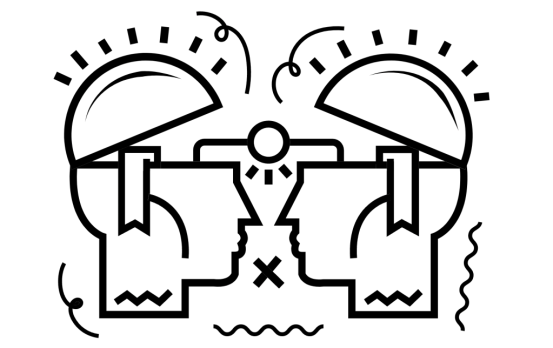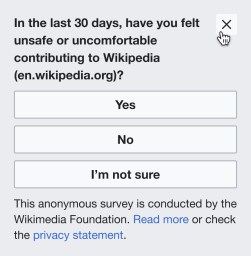Happy new year from the Global Data & Insights team! As we enter 2023, we wanted to reflect on our 2022 survey findings about on-wiki feelings of safety and experiences of harassment across the Movement. This post will be the first of a multi-part series exploring the Community Safety and Community Insights survey data on this topic, so look out for our next post in February.
In March 2022, we began conducting the single-question Community Safety Survey on 5 Wikipedias: English, Farsi, French, Spanish, and Portuguese. The survey asked logged-in editors on each Wikipedia language project, “In the last 30 days, have you felt unsafe or uncomfortable contributing to Wikipedia?” and was repeated 3 times over the course of 2022. We will be exploring the combined data here, while the individual results of each 2022 survey can be found on the Community Safety reports page.
Likewise, from June through September 2022, we collected data for the Community Insights survey, which invites active editors across wiki projects to help us better understand our global movement. The full report for the Insights survey will be available later this quarter, while we focus specifically on the safety and harassment questions in this post.
Core findings:
- For each wiki, survey results were similar across multiple waves in 2022. This stability suggests that each language project has a collective “sense of safety,” rather than safety sentiments being driven primarily by individual incidents and events.
- Users with higher edit counts are more likely to report both feeling unsafe and being harassed.
Why do we measure feelings?
In short, feelings matter, and not just for individual well-being. Collectively held sentiments sway global economic markets (Nowzohour & Stracca 2020) and shape national elections (Redlawsk & Pierce 2017). Collective feelings change our behaviors, and those behaviors have global ramifications which can shift how we engage with each other. In online communities, feelings impact how and to what extent we interact online (van Schaik et al. 2018). Safety sentiments can be shaped by interactions among users, by reading how others interact even if an individual is not engaging, by government actions regarding online expression, and dozens of other factors. In turn, feeling safe or unsafe on an individual level can mean the difference between making an edit, taking a break, or slowly disengaging from the community. When it spreads to our collective sense of a space, these individual actions have widespread effects.
Let’s get to the results!
2022 Community Safety surveys
For this analysis, we combined the three Community Safety surveys from March, June, and September to understand safety perceptions for the entirety of 2022. This grouped data tells us something like, “What percent of users on this language Wikipedia are feeling unsafe or uncomfortable at any point in time?” We also categorized responses by edit count ranges (5-99, 100-999, and 1000+ lifetime edits on the wiki) so that we can look at whether safety sentiments differ among more or less active editors.
Due to global cultural and linguistic differences in how people respond to survey questions (Kemmelmeier 2016), we discourage comparisons across wikis. Instead, we invite members of each community to consider why we are seeing the results we are seeing on their project and what might be done to improve feelings of safety in their language spaces.
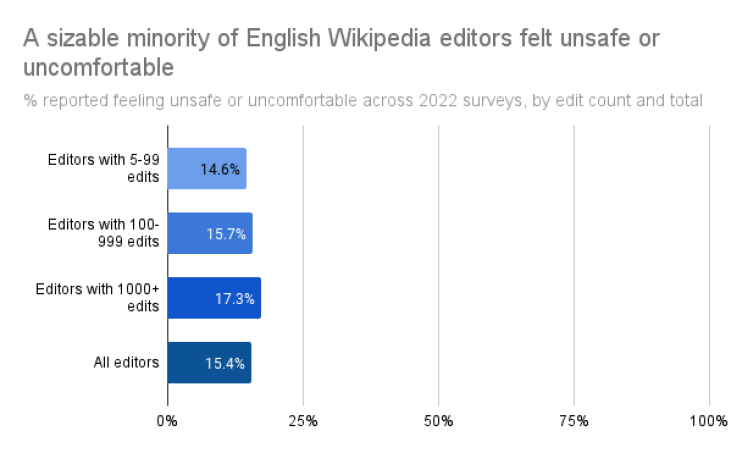
Figure 1. Percent of users who responded “Yes” to the question “In the past 30 days, have you felt unsafe or uncomfortable contributing to Wikipedia (en.wikipedia.org)?” across three 2022 surveys, split by lifetime edit count and grouped in total.
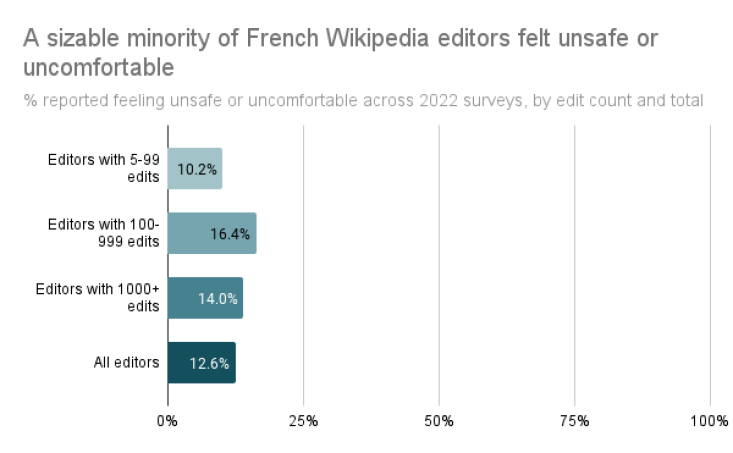
Figure 2. Percent of users who responded “Yes” to the question “In the past 30 days, have you felt unsafe or uncomfortable contributing to Wikipedia (fr.wikipedia.org)?” across three 2022 surveys, split by lifetime edit count and grouped in total.
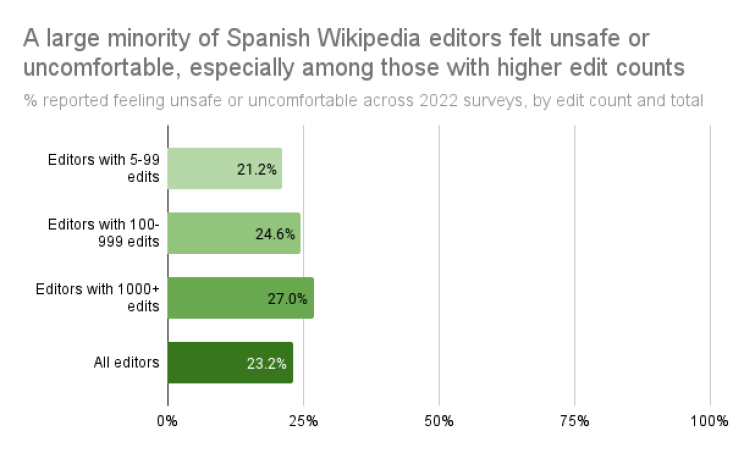
Figure 3. Percent of users who responded “Yes” to the question “In the past 30 days, have you felt unsafe or uncomfortable contributing to Wikipedia (es.wikipedia.org)?” across three 2022 surveys, split by lifetime edit count and grouped in total.
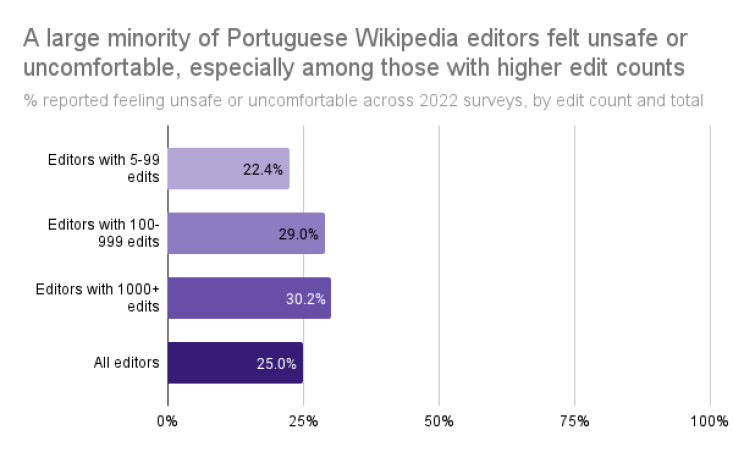
Figure 4. Percent of users who responded “Yes” to the question “In the past 30 days, have you felt unsafe or uncomfortable contributing to Wikipedia (pt.wikipedia.org)?” across three 2022 surveys, split by lifetime edit count and grouped in total.
Comparing these overall 2022 results to the quarterly meta.wiki reports, we see stability across the year on each wiki, suggesting that the percent of users feeling unsafe is neither increasing nor decreasing substantially. In the combined 2022 data, we see that higher editing activity results in higher chances of users feeling unsafe or uncomfortable in each language space.
Based on these results, we draw two key conclusions:
- Stable results across the year imply that broad understandings of safety are part of the collective consciousness of a wiki. This means that safety sentiments are widespread and durable across time, indicating that they likely stem from the social structure of the communities rather than from singular events. Addressing collective feelings of unsafety thus means addressing how we interact structurally. Interventions need to be community-specific in identifying what and how to change, in addition to broader initiatives such as the Universal Code of Conduct and technical interventions such as IP editing restrictions.
- Across these projects, we see that users with higher edit counts are more likely to report having felt unsafe. This indicates that although outside factors likely contribute to users feeling unsafe, editing interactions also affect users’ sense of safety. Seasoned editors may be better able to recognize an interaction as unsafe or uncomfortable, while higher editing activity may result in more potential for exposure to an uncomfortable interaction.
Insights survey affirms relationship between safety and editing activity
We find a similar pattern in the Community Insights survey, increasing our confidence in the above findings. Of note: questions asked in Community Insights refer to the past year rather than the past 30 days, and the survey samples “active contributors” who made at least 10 edits in the three months before the data collection. In doing so, these questions answer something more akin to, “How many active users across the globe have felt unsafe or uncomfortable in the last year?” and “How many active users across the globe have experienced harassment in the last year?”
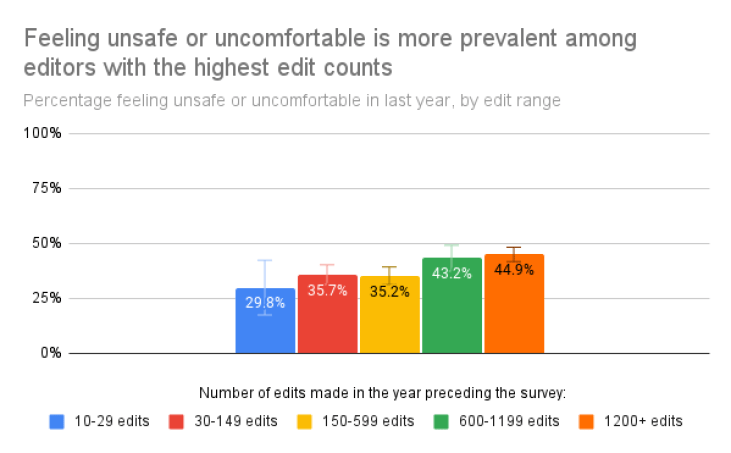
Figure 5. Percent of active Wikimedia contributors who reported having felt unsafe or uncomfortable contributing in the year preceding the survey, by edit bin for the last year.
Among Community Insights respondents, we see a progressive increase in reports of having felt unsafe among users who have contributed more edits during the course of the year (Figure 5). This gives further evidence that interacting on-wiki is a risk for feeling unsafe, alongside all external factors and broadly held sentiments.
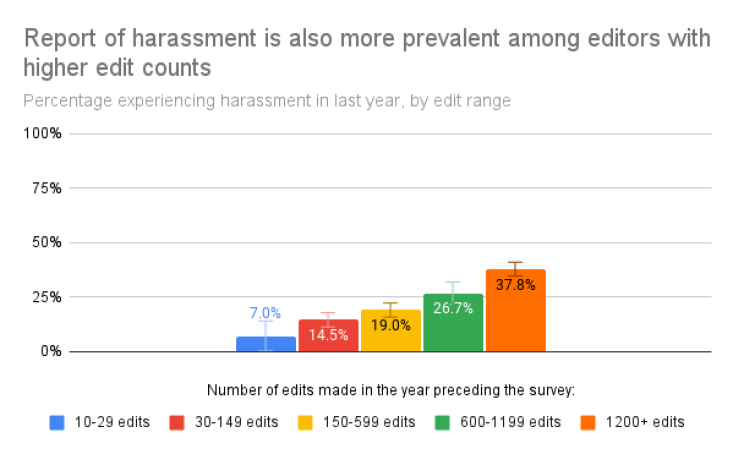
Figure 6. Percent of active Wikimedia contributors who reported having been harassed in the year preceding the survey, by edit bin for the last year.
Finally, we see a clear trend where users who made more edits within a year were likewise more likely to report having been harassed (Figure 6).
What’s next? Join us in our learning journey to explore the intersections of on-wiki safety and harassment
In many ways, the result that higher-activity editors are more likely to report feeling unsafe or being harassed on-wiki is not surprising. Interacting more often means more chances for a negative exchange to occur. However, this singular point of data leaves us with more questions. Are higher-activity editors also taking on more intensive roles on their wikis, which might account for these differences? Are specific demographic groups more likely to feel unsafe? In the next posts in this series, we will look further into the 2022 Community Insights safety and harassment questions. We look forward to continuing the conversation, and welcome your perspectives on the Community Safety Talk Page or privately to our email at surveys@wikimedia.org.
Note: Farsi Wikipedia data is not reported in this post, as we temporarily paused data collection in September 2022.

Can you help us translate this article?
In order for this article to reach as many people as possible we would like your help. Can you translate this article to get the message out?
Start translation
